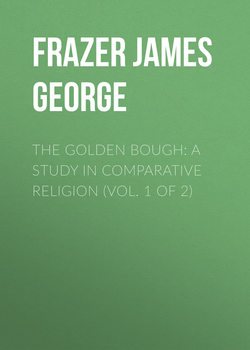The Golden Bough: A Study in Comparative Religion (Vol. 1 of 2)

Реклама. ООО «ЛитРес», ИНН: 7719571260.
Оглавление
Frazer James George. The Golden Bough: A Study in Comparative Religion (Vol. 1 of 2)
Preface
Chapter I. The King Of The Wood
§ 1. – The Arician Grove
§ 2. – Primitive man and the supernatural
§ 3. – Incarnate gods
§ 4. – Tree-worship
§ 5. – Tree-worship in antiquity
Chapter II. The Perils Of The Soul
§ 1. – Royal and priestly taboos
§ 2. – The nature of the soul
§ 3. – Royal and priestly taboos (continued)
Chapter III. Killing The God
§ 1. – Killing the divine king
§ 2. – Killing the tree-spirit
§ 3. – Carrying out Death
§ 4. – Adonis
§ 5. – Attis
§ 6. – Osiris
§ 7. – Dionysus
§ 8. – Demeter and Proserpine
§ 9. – Lityerses
Отрывок из книги
Who does not know Turner's picture of the Golden Bough? The scene, suffused with the golden glow of imagination in which the divine mind of Turner steeped and transfigured even the fairest natural landscape, is a dream-like vision of the little woodland lake of Nemi, “Diana's Mirror,” as it was called by the ancients. No one who has seen that calm water, lapped in a green hollow of the Alban hills, can ever forget it. The two characteristic Italian villages which slumber on its banks, and the equally Italian palazzo whose terraced gardens descend steeply to the lake, hardly break the stillness and even the solitariness of the scene. Dian herself might still linger by this lonely shore, still haunt these woodlands wild.
In antiquity this sylvan landscape was the scene of a strange and recurring tragedy. On the northern shore of the lake, right under the precipitous cliffs on which the modern village of Nemi is perched, stood the sacred grove and sanctuary of Diana Nemorensis, or Diana of the Wood.2 The lake and the grove were sometimes known as the lake and grove of Aricia.3 But the town of Aricia (the modern La Riccia) was situated about three miles off, at the foot of the Alban Mount, and separated by a steep descent from the lake, which lies in a small crater-like hollow on the mountain side. In this sacred grove there grew a certain tree round which at any time of the day and probably far into the night a strange figure might be seen to prowl. In his hand he carried a drawn sword, and he kept peering warily about him as if every instant he expected to be set upon by an enemy.4 He was a priest and a murderer; and the man for whom he looked was sooner or later to murder him and hold the priesthood in his stead. Such was the rule of the sanctuary. A candidate for the priesthood could only succeed to office by slaying the priest, and having slain him he held office till he was himself slain by a stronger or a craftier.
.....
Sometimes it is the souls of the dead which are believed to animate the trees. The Dieyerie tribe of South Australia regard as very sacred certain trees, which are supposed to be their fathers transformed; hence they will not cut the trees down, and protest against the settlers doing so.224 Some of the Philippine Islanders believe that the souls of their forefathers are in certain trees, which they therefore spare. If obliged to fell one of these trees they excuse themselves to it by saying that it was the priest who made them fell it.225 In an Annamite story an old fisherman makes an incision in the trunk of a tree which has drifted ashore; but blood flows from the cut, and it appears that an empress with her three daughters, who had been cast into the sea, are embodied in the tree.226 The story of Polydorus will occur to readers of Virgil.
In these cases the spirit is viewed as incorporate in the tree; it animates the tree and must suffer and die with it. But, according to another and no doubt later view, the tree is not the body, but merely the abode of the tree-spirit, which can quit the injured tree as men quit a dilapidated house. Thus when the Pelew Islanders are felling a tree, they conjure the spirit of the tree to leave it and settle on another.227 The Pádams of Assam think that when a child is lost it has been stolen by the spirits of the wood. So they retaliate on the spirits by cutting down trees till they find the child. The spirits, fearing to be left without a tree in which to lodge, give up the child, and it is found in the fork of a tree.228 Before the Katodis fell a forest-tree, they choose a tree of the same kind and worship it by presenting a cocoa-nut, burning incense, applying a red pigment, and begging it to bless the undertaking.229 The intention, perhaps, is to induce the spirit of the former tree to shift its quarters to the latter. In clearing a wood, a Galeleze must not cut down the last tree till the spirit in it has been induced to go away.230 The Mundaris have sacred groves which were left standing when the land was cleared, lest the sylvan gods, disquieted at the felling of the trees, should abandon the place.231 The Miris in Assam are unwilling to break up new land for cultivation so long as there is fallow land available; for they fear to offend the spirits of the woods by cutting down trees unnecessarily.232
.....